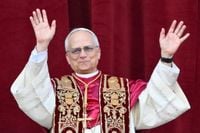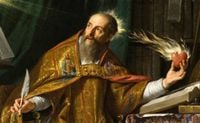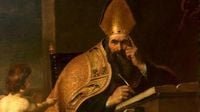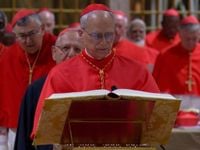On May 8, 2025, Cardinal Robert Francis Prevost was elected as the new Pope of the Catholic Church, taking the name Leo XIV. His election was confirmed shortly after white smoke billowed from the chimney of the Sistine Chapel, signaling the conclusion of the conclave. Prevost, who is the first Pope from the United States, addressed the public from the balcony of St. Peter's Basilica, switching between Italian and Spanish, and expressed his gratitude to the diocese of Chiclayo, Peru, where he spent a significant portion of his ecclesiastical career.
During his inaugural speech, Prevost emphasized his connection to the Augustinian order, stating, "I am a son of Saint Augustine. An Augustinian." This declaration highlights the values he may bring to his papacy, rooted in the teachings of Saint Augustine, a key figure in Christian theology. The new Pope concluded his message with the Ave Maria prayer, further reinforcing his ties to tradition.
Prevost was elected by 89 of the 133 cardinals, achieving the two-thirds majority required to assume the papacy. He succeeds Pope Francis, who passed away on April 21, 2025, after leading the Catholic Church for 12 years. The conclave began on May 7, 2025, and after a series of votes, the white smoke appeared at approximately 1:08 PM Brasília time, indicating a new leader had been chosen.
Born on September 14, 1955, in Chicago, Illinois, Prevost is 69 years old and has spent much of his religious life in Latin America, particularly in Peru. He entered the Augustinian order in 1977 and was ordained a priest in 1982. His extensive experience in the Church includes serving as a bishop, and he was appointed cardinal by Pope Francis in September 2023.
The new Pope's background is rich with significant roles, including his appointment as the apostolic administrator of the diocese of Chiclayo in 2014, where he later became bishop. Prevost's leadership has been marked by a commitment to community service, humility, and a strong emphasis on education and pastoral care.
In his first address, Leo XIV expressed a desire to continue the legacy of his predecessor, stating, "I want to continue with the blessing of Pope Francis." This sentiment reflects a commitment to maintaining continuity within the Church while also addressing modern challenges. His dual fluency in Italian and Spanish suggests an inclusive approach to communication with the global Catholic community, which numbers approximately 1.4 billion followers worldwide, including 182 million in Brazil.
Prevost's election comes at a time when the Catholic Church faces a decline in membership and increasing scrutiny over its handling of various issues, including allegations of abuse within its ranks. Notably, during his tenure in Peru, Prevost dealt with accusations regarding the cover-up of sexual abuse cases involving priests. The diocese has denied any wrongdoing, asserting that Prevost followed proper procedures in addressing the allegations.
As Pope, Leo XIV will have to navigate the complexities of modern society while upholding the traditions of the Church. His approach to social issues, including the environment, immigration, and racial justice, will be closely watched. In past statements, Prevost has expressed opposition to the death penalty and advocated for a more compassionate approach to immigration, reflecting a commitment to the Church's social teachings.
Saint Augustine, after whom Prevost identifies, was a pivotal figure in the development of Western Christian thought. Born in 354 in Tagaste, present-day Algeria, Augustine's early life was marked by a struggle between his pagan upbringing and his eventual conversion to Christianity, heavily influenced by his mother, Saint Monica. His writings, including the "Confessions" and "The City of God," continue to resonate within theological discussions today.
The Order of Saint Augustine, to which Prevost belongs, is known for its focus on community life, study, and pastoral service. Founded in the 13th century, the order emphasizes the importance of dialogue, humility, and charity, values that align with Prevost's vision for his papacy.
As the newly elected Pope, Prevost faces a unique set of challenges and opportunities. His American background and experience in Latin America position him to bridge cultural divides within the Church. Observers note that his election may signal a shift towards a more reformist agenda, continuing the legacy of Pope Francis while addressing the pressing needs of a diverse global congregation.
In his first public appearance as Pope, Leo XIV shared a message of peace and hope, stating, "May peace be with you all. I want to offer a blessing of peace that reaches your families, all of you, wherever you are. Sin will not prevail; we are all in the hands of God." This message resonates with many who seek comfort and guidance in turbulent times.
As the world watches, the new Pope will undoubtedly face scrutiny regarding his positions on contentious issues such as the ordination of women and the Church's stance on LGBTQ+ rights. Prevost has previously expressed his views on these matters, indicating a cautious approach that respects traditional teachings while also acknowledging the need for dialogue and understanding.
With a deep commitment to the values of his order and a desire to serve the global Catholic community, Leo XIV's papacy is poised to leave a significant mark on the Church's future. As he embarks on this new journey, the faithful around the world await to see how he will lead the Church through contemporary challenges while remaining true to its core values.




